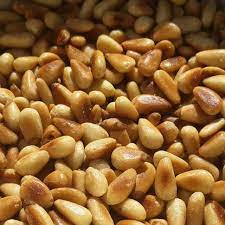Keywords: Pine nuts, health benefits, nutrients, composition, antioxidants, omega-3 fatty acids, fiber, protein, magnesium, iron, zinc, manganese
Introduction:
Pine nuts, also known as pignolia nuts or piñón nuts, are the edible seeds of pine trees. These tiny gems have been prized for centuries for their unique flavor and nutritional value. In recent years, pine nuts have gained popularity as a superfood due to their impressive array of health benefits.
Nutritional Composition of Pine Nuts:
Pine nuts are a powerhouse of nutrients, packed with essential vitamins, minerals, and healthy fats. Here’s a breakdown of their nutritional content:
-
Healthy Fats: Pine nuts are a rich source of monounsaturated and polyunsaturated fats, particularly pinoleic acid, a type of omega-3 fatty acid. These healthy fats play a crucial role in heart health, cognitive function, and inflammation reduction.
-
Protein: Pine nuts provide a good amount of protein, essential for building and repairing tissues, maintaining muscle mass, and supporting overall health.
-
Fiber: Pine nuts are a good source of dietary fiber, which promotes digestive health, regulates blood sugar levels, and contributes to a feeling of fullness.
-
Vitamins and Minerals: Pine nuts are packed with essential vitamins and minerals, including vitamin E (an antioxidant), vitamin K (important for blood clotting), magnesium (crucial for muscle and nerve function), iron (essential for oxygen transport), zinc (important for immune function), and manganese (plays a role in energy production and antioxidant defense).
Health Benefits of Pine Nuts:
The impressive nutritional profile of pine nuts translates into a wide range of health benefits. Here are some of the key benefits:
-
Heart Health: The healthy fats and antioxidants in pine nuts contribute to heart health by lowering LDL (bad) cholesterol levels, reducing blood pressure, and improving blood vessel function.
-
Brain Health: Pine nuts’ omega-3 fatty acids and antioxidants support cognitive function, protect against neurodegenerative diseases like Alzheimer’s and Parkinson’s, and may enhance memory.
-
Diabetes Management: Pine nuts’ fiber content helps regulate blood sugar levels, improving glycemic control and reducing the risk of diabetes complications.
-
Digestive Health: The fiber in pine nuts promotes digestive health by adding bulk to stool, regulating bowel movements, and supporting the growth of beneficial gut bacteria.
-
Immune Function: Pine nuts’ zinc content supports immune function by boosting the production of white blood cells, the body’s defense against infections.
Incorporating Pine Nuts into Your Diet:
Pine nuts are a versatile ingredient that can be enjoyed in various ways. Here are some ideas:
-
Sprinkle them on salads, yogurt, or oatmeal.
-
Add them to pesto, trail mix, or granola bars.
-
Use them as a garnish for soups, stews, or pasta dishes.
-
Enjoy them as a healthy snack on their own.
Conclusion:
Pine nuts are not only a delicious and versatile ingredient but also a nutritional powerhouse offering a wealth of health benefits. Their rich content of healthy fats, fiber, vitamins, and minerals makes them an excellent addition to a balanced diet. So, embrace these tiny gems of nature and reap their remarkable rewards for overall well-being.



